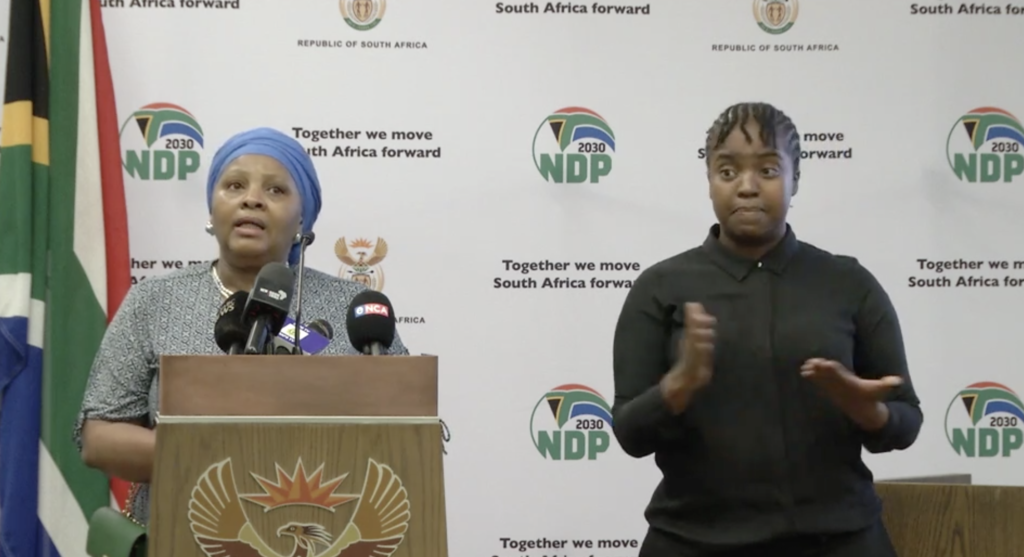South Africa has confirmed 1 170 positive coronavirus cases on the first day of the nationwide lockdown. Ministers from key Departments addressed the nation on the rollout of the first day of the lockdown on Friday, March 27.
SANDF begin deployment
Minister of Defence Nosiviwe Noluthando Mapisa-Nqakula confirmed that the SANDF had been deployed in all ten provinces at the beginning of the shutdown.
She confirmed that the SANDF are deployed to support the police services in enforcing the shutdown but do not have power to arrest people.
The SANDF have been assisting in areas already but experienced some setbacks.
“This pandemic is a killer. The situation we are finding ourselves is a very serious one. We are fighting an invisible enemy and this is what our people need to bear in mind,” she said.
She confirmed that not all of the 3 000 soldiers had been deployed yet, with others still waiting for deployment orders.
Mapisa-Nqakula also addressed the concern over the President wearing the SANDF uniform during his speech to the army last night. She explained it was not out of the norm for the President, as the Commander in Chief, to wear the uniform.
“The uniform worn by the president had no ranks on it. The uniform the president was wearing, was camouflage, it’s an overall. It is worn when you know you are going to work,” she said.
Police implement lockdown from midnight
Minister Bheki Cele confirmed that police began enforcing the lockdown from midnight last night [March 26]. This was largely done using roadblocks, of which the police deployed 172 across the country.
24 000 police, both metro and SAPS were deployed to assist with enforcing the lockdown.
“We had a good night, we had a success,” said Cele.
Overall, the police arrested 55 people across the country, of which two were in the Western Cape. However, he wanted to assure South Africans that the police are not there to punish them.
Cele acknowledged and thanked South Africans who had been submitting complaints regarding lockdown breakers to the police. He also issued a stern warning for those who don’t comply.
“Lets be serious about it, let’s be safe about it” he said, “If you don’t join us, if you don’t walk with us, we pull you to walk with us.”
Transport faces difficulties with taxis
Many complaints of taxis not complying to the 60% capacity rule as instituted by the government were received on the first day of lockdown.
Minister of Transport Fikile Mbalula acknowledged the issue of long queues and full taxis, who were taking essential service workers to their jobs. He said his Department had engaged with the taxi organisations on this issue.
“We appeal once more to taxi owners to understand because public transport in general is shutdown and there is only a provision limited to essential workers,” he said.
Long-distance travel was also addressed, with those who were attempting to make their way to different provinces being stopped and turned around at roadblocks.
“We are in this together,” said Mbalula.
He did acknowledge that they are discouraging people from using taxis to go get groceries. He said they that residents should rather use stores in walking distance.
Grocery stores were still full
Long lines outside grocery stores, since today was the day after payday, was a challenge faced by many stores, said Minister of Trade and Industry Ebrahim Patel.
He assured people that food production continued as normal today, with grocery stores planning to restock their shelves over the weekend. He said they are discussing with store owners how they can improve social distancing while still allowing people to get groceries.
According to Patel 50 000 companies registered their business as essentials services, totaling 1.5-million workers who will be keeping essential services running. Roughly 40 000 of these have been issued their permits, with others being given theirs soon.
Patel also explained that there has been an expansion of regulations which identifies goods considered basic services. These now include products for the care of babies and toddlers and personal toiletries.
He said a full list of updated necessary goods and essential services on Government sites and social media.
Finally, he issued another set of stern warnings to businesses found exploiting South Africans by hiking prices. He said the government would not hesitate to issue fines which could ultimately cripple businesses who do not comply.
Home Affairs deals with Zimbabwean border
Before the lockdown, foreign nationals from Zimbabwe, Zambia and Malawi were lining up at the Beitbridge border to try and get across before they closed.
Minister of Home Affairs Aaron Mostoaledi confirmed the congestion, and a confusion with regards to Zambia’s own lockdown had to be dealt with in order to ensure a smooth crossing before the 12am deadline.
Image: Screenshot

